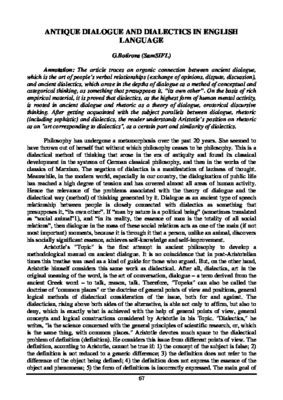
67
ANTIQUE DIALOGUE AND DIALECTICS IN ENGLISH
LANGUAGE
G.Botirova (SamSIFL)
Annotation:
The article traces an organic connection between ancient dialogue,
which is the art of people’s verbal relationships (exchange of opinions, dispute, discussion),
and ancient dialectics, which arose in the depths of dialogue as a method of conceptual and
categorical thinking, as something that presupposes it, “its own other”. On the basis of rich
empirical material, it is proved that dialectics, as the highest form of human mental activity,
is rooted in ancient dialogue and rhetoric as a theory of dialogue, oratorical discursive
thinking. After getting acquainted with the subject parallels between dialogue, rhetoric
(including sophistic) and dialectics, the reader understands Aristotle’s position on rhetoric
as an "art corresponding to dialectics", as a certain part and similarity of dialectics.
Philosophy has undergone a metamorphosis over the past 20 years. She seemed to
have thrown out of herself that without which philosophy ceases to be philosophy. This is a
dialectical method of thinking that arose in the era of antiquity and found its classical
development in the systems of German classical philosophy, and then in the works of the
classics of Marxism. The negation of dialectics is a manifestation of laziness of thought.
Meanwhile, in the modern world, especially in our country, the dialogization of public life
has reached a high degree of tension and has covered almost all areas of human activity.
Hence the relevance of the problems associated with the theory of dialogue and the
dialectical way (method) of thinking generated by it. Dialogue as an ancient type of speech
relationship between people is closely connected with dialectics as something that
presupposes it, “its own other”. If “man by nature is a political being” (sometimes translated
as “social animal”1), and “in its reality, the essence of man is the totality of all social
relations”, then dialogue in the mass of these social relations acts as one of the main (if not
most important) moments, because it is through it that a person, unlike an animal, discovers
his socially significant essence, achieves self-knowledge and self-improvement.
Aristotle’s "Topic" is the first attempt in ancient philosophy to develop a
methodological manual on ancient dialogue. It is no coincidence that in post-Aristotelian
times this treatise was used as a kind of guide for those who argued. But, on the other hand,
Aristotle himself considers this same work as dialectical. After all, dialectics, art in the
original meaning of the word, is the art of conversation, dialogue – a term derived from the
ancient Greek word – to talk, reason, talk. Therefore, "Topeka" can also be called the
doctrine of "common places" or the doctrine of general points of view and positions, general
logical methods of dialectical consideration of the issue, both for and against. The
dialectician, rising above both sides of the alternative, is able not only to affirm, but also to
deny, which is exactly what is achieved with the help of general points of view, general
concepts and logical constructions considered by Aristotle in his Topic. "Dialectics," he
writes, "is the science concerned with the general principles of scientific research, or, which
is the same thing, with common places." Aristotle devotes much space to the dialectical
problem of definition (definition). He considers this issue from different points of view. The
definition, according to Aristotle, cannot be true if: 1) the concept of the subject is false; 2)
the definition is not reduced to a generic difference; 3) the definition does not refer to the
difference of the object being defined; 4) the definition does not express the essence of the
object and phenomena; 5) the form of definitions is incorrectly expressed. The main goal of

68
a definition is to achieve clarity of knowledge, therefore, naturally, definitions should be
formed through clear expressions. And, finally, in the eighth chapter, summing up the book
of Topeka, Aristotle points out those general rules that guide both the objector and the
defender in the dialogue. Here such methods of conducting a dispute are given, such as the
order of posing questions, finding the main point of view, and other questions associated
with logic and dialectics, which it is not possible to consider in more detail in this case.
However, let's say that, generalizing all the basic techniques known in ancient dialogic
practice, Aristotle in his dialogical writings gives more than 200 dialogical tops of logical-
dialectical content, rules and features of their application, methodological recommendations.
Thus, having carried out the most difficult work on the methodological search for the
logical-dialectical structure of the dialogue, Aristotle appears before us as the founder of the
theory of scientific dispute, dialogue, rhetoric, the significance of which he, although he
does not dispute, nevertheless notes that “if the public consisted exclusively of reasonable
and good people, who would always be able to prefer rational content to suggestions of
sensuous form, there would be no need at all for the art of the word.
REFERENCES:
1. Fedorova I.V. Educational dictionaries of a new generation and their potential in
teaching foreign vocabulary. // p.-324-333 // All-Russian Scientific and Practical
Conference. Textbook – student – teacher. M.2003.-358 p.
2. Strevens P. The Effectiveness of Learners' Dictionaries. Studies in Lexicography.
Ed. by Burchfield, Oxford. 1987, 200 p.
3. McArthur T. Longman Lexicon of Contemporary English. Longman Group
Limited. 1981.
4. Merriam-Webster's Dictionary of Synonyms, Springfield, Mass, USA., 1984.-31.
909 p.
5. Ryabtseva H.K. The new dictionary is an active type dictionary. Scientific speech
in English. 2nd ed. M., 200-600c.
6. Bahriddinova B.M. Educational dictionary in Uzbekistan: linguistic bases, history
and prospects. Doctor of Philology (DSc)… dis.author.- Samarkand 2020






